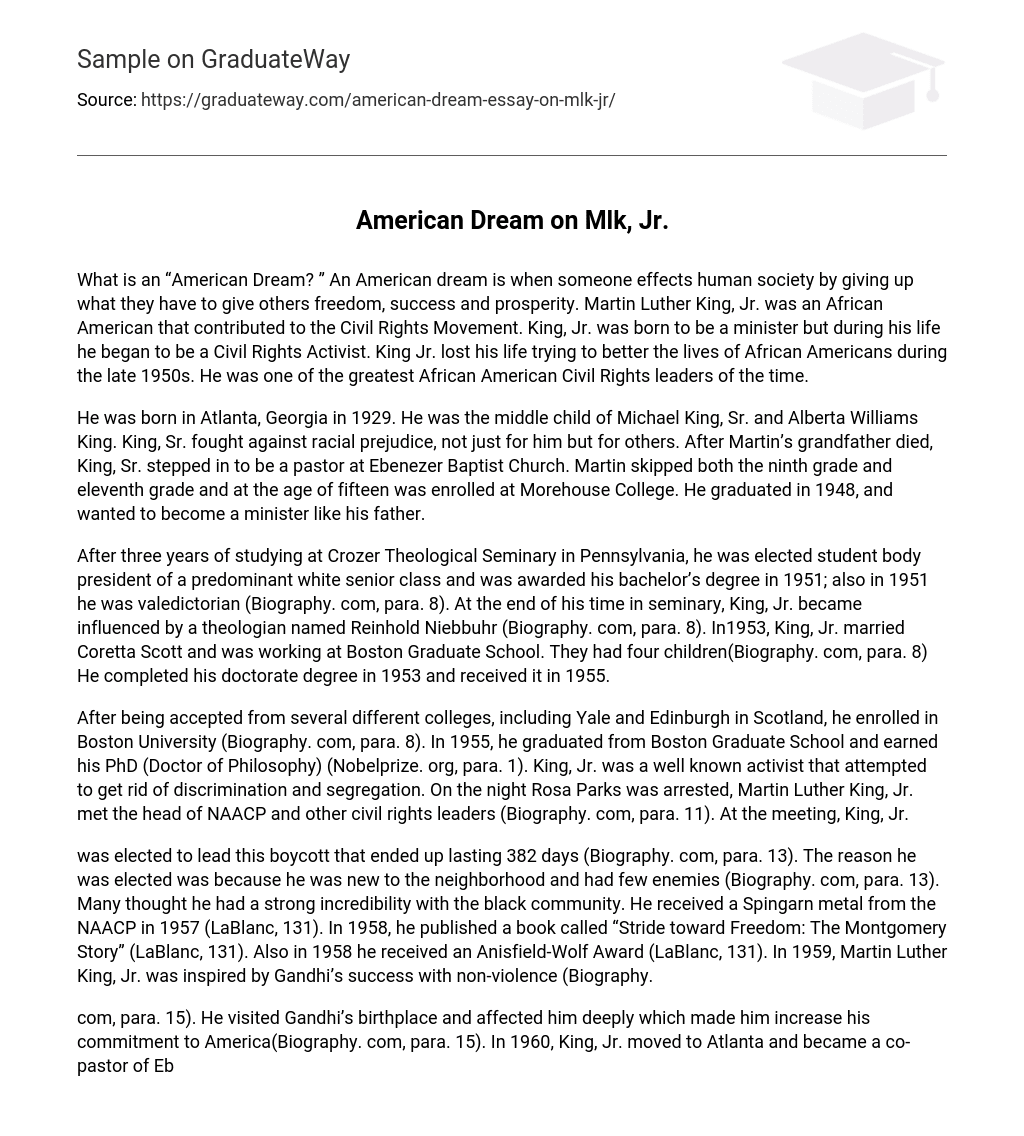What is the American Dream”? The American Dream is when someone sacrifices what they have to provide others with freedom, success, and prosperity. Martin Luther King Jr. was an African American who made significant contributions to the Civil Rights Movement. Although he was born to be a minister, he became a Civil Rights Activist during his lifetime. King Jr. lost his life while striving to improve the lives of African Americans in the late 1950s and remains one of the greatest African American Civil Rights leaders of all time.
Martin Luther King Jr. was born in Atlanta, Georgia in 1929 as the middle child of Michael King Sr. and Alberta Williams King. His father fought against racial prejudice not only for himself but also for others. When Martin’s grandfather passed away, his father took over as a pastor at Ebenezer Baptist Church.
At the age of fifteen, Martin skipped both ninth and eleventh grade and enrolled at Morehouse College. He graduated in 1948 with a desire to become a minister like his father.
After studying at Crozer Theological Seminary in Pennsylvania for three years, he was elected as the student body president of a predominantly white senior class. In 1951, he was awarded his bachelor’s degree and also became the valedictorian (Biography.com, para. 8). During his time in seminary, King Jr. was influenced by a theologian named Reinhold Niebbuhr (Biography.com, para. 8). In 1953, King Jr. married Coretta Scott and began working at Boston Graduate School while raising their four children (Biography.com, para. 8). He completed his doctorate degree in 1953 and received it in 1955.
After being accepted to several colleges, including Yale and Edinburgh in Scotland, Martin Luther King, Jr. enrolled at Boston University (Biography.com, para. 8). In 1955, he graduated from the Boston Graduate School and earned his PhD (Doctor of Philosophy) (Nobelprize.org, para. 1). King was a well-known activist who fought against discrimination and segregation. On the night Rosa Parks was arrested, he met with the head of NAACP and other civil rights leaders (Biography.com, para. 11). During this meeting, King discussed plans for a boycott that would later become known as the Montgomery Bus Boycott.
Martin Luther King, Jr. was elected to lead the boycott that ended up lasting 382 days (Biography.com, para. 13). He was chosen because he was new to the neighborhood and had few enemies (Biography.com, para. 13), which made him credible with the black community. In recognition of his efforts, he received a Spingarn Medal from the NAACP in 1957 (LaBlanc, 131). The following year, he published a book titled Stride Toward Freedom: The Montgomery Story” (LaBlanc, 131) and also received an Anisfield-Wolf Award (LaBlanc, 131). In 1959, Martin Luther King Jr. drew inspiration from Gandhi’s success with non-violence (Biography).
In 1959, Martin Luther King Jr. visited Gandhi’s birthplace, which deeply affected him and increased his commitment to America (Biography.com, para. 15). In 1960, he moved to Atlanta and became a co-pastor of Ebenezer Baptist Church. Two years later, King Jr. was convicted of leading a march in Albany protesting segregated buses that began with the arrest of Rosa Parks for not giving up her seat to a white man. King Jr.’s leadership skills were evident as he led protests and rallied people together towards the cause of equal rights between races.
Martin Luther King Jr. was elected President of the Montgomery Improvement Association (Biography.com, para. 11). He encouraged others to stand up for themselves and after the protests ended, white people” attempted to kill him by bombing his house (Nobelprize.org, para. 2). During the sixties, African Americans began sitting at “white” tables to demonstrate their desire to eliminate segregation. When they refused to leave, Martin Luther King Jr. and thirty-six others were arrested (Biography.com, para. 17). The mayor negotiated a truce and dropped the charges.
According to Biography.com, Southern policemen broke up protests by using hoses and dogs to halt the protesters (para. 18). The violence was captured on television, and as a result, President Kennedy signed the Civil Rights Bill (para. 17). In 1964, King became the youngest man to receive the Nobel Peace Prize. He turned over the prize money ($54,123) to further the civil rights movement (para. 22).
On March 9, 1965, King led a group of 2,500 marchers – both white and black – to Pettus Bridge with intentions of confronting troopers. However, instead of confrontation they were led in prayer before turning back.
Martin Luther King, Jr. received the Judaism and World Peace Award from the Synagogue Council of America (LaBlanc, 131). He also received the Brotherhood Award in 1967 for his work on Where Do We Go from Here: Chaos or Community?” (LaBlanc, 131). In 1968, he was honored with the Nehru Award for International Understanding (LaBlanc, 131). Tragically, while giving a speech in Memphis, Tennessee in front of a large crowd that same year, Martin Luther King Jr. was assassinated by James Ray – a convict who was later sentenced to nine years in prison.
After Martin Luther King, Jr.’s death, he was awarded the Presidential Medal of Freedom (LaBlanc, 131). Additionally, riots broke out in 125 different cities resulting in numerous deaths, injuries, arrests and burials. To this day we honor and remember him with a holiday dedicated to his work towards integration. Today we see the results of his efforts with integrated schools, libraries and restrooms among many other public places. Although Martin Luther King Jr. changed many lives for the better, unfortunately some still do not follow discrimination laws that exist today.
Martin Luther King Jr. had an American dream” because he went through almost being killed, having enemies, and putting his family in danger. He didn’t have to sacrifice his life to save others, but he did.
Work Cited Page:
- Martin Luther King Jr. – Biography. Nobelprize.org. 18 March 2013 <http://www.nobelprize.org/nobel_prizes/peace/laureates/1964/king-bio.html>
- Martin Luther King Jr. (2013). The Biography Channel website. 19 March 2013, 11:21 <http://www.biography.com/people/martin-luther-king-jr-9365086>
- LaBlanc, M. (1992). Contemporary Black Biography. Detroit: Gale Research.





